- Home
- Tony Hillerman
The Shape Shifter Page 4
The Shape Shifter Read online
Page 4
Tarkington paused, raised his eyebrows. “But I guess I don’t need to refresh your memory about the Long Walk.”
“No,” Leaphorn said, smiling. “My maternal grandfather used to tell us about freezing to death out there in his winter hogan stories when I was a boy. And then my paternal great-grandfather had his own stories about the bunch who escaped that roundup, and spent those years hiding out in the mountains.”
Tarkington chuckled “And the government then makes sure you don’t forget it. Calls a big piece of your space out here the Kit Carson National Forest, in memory of the colonel in charge of rounding you up, and burning down your hogans, and chopping down your peach orchards.”
“We don’t blame Kit Carson much,” Leaphorn said. “He comes out pretty decent in the hogan stories, and the history books, too. It was General George Carlton who issued that General Order 15 and gave the shoot-to-kill and scorched-earth orders.”
“Most Americans never heard of that, I’m afraid,” Tarkington said. “We don’t teach our kids our version of how we tried Hitler’s final solution on you folks. Round you all up, kill anyone who tries to escape, drive off the cattle, let the Indians starve. We ought to have a chapter in all our history books describing that.”
Tarkington took the final bite of his sandwich, considering this, seeming to Leaphorn to be more troubled by the failing of historians than by the deed itself.
“There’ll never be a chapter on that,” Leaphorn said. “And I’m glad there isn’t. Why keep that kind of hatred alive? We have our curing ceremonials to get people back in harmony. Get rid of the anger. Get happy again.”
“I know,” Tarkington said. “But according to the stories I hear, a lot of memories of that brutality live on in that Woven Sorrow rug. They say that when the Navajo headmen signed that treaty with General Sherman in 1866 and the survivors started their long walk home, that young woman and her sister brought the beginnings of the rug with them and kept working on it, working in little reminders of their treatment. Little bit of a root woven in here, and rat hair there, and so forth, as reminders of what they were eating to keep from starving. Anyway, so the story goes, the weaving went on when the families began getting their flocks reestablished for some good wool. And other people heard about it, and more weavers got a hand in it and added another bitter memory of misery and murder and dying children. And then, finally, one of the clan headmen, some say it was either Barboncito or Manuelito, told the weavers it violated the Navajo way to preserve evil. He wanted all the weavers to arrange an Enemy Way sing to cure themselves of all those hateful memories and restore themselves to harmony.”
Tarkington took a sip of water. “What do you think of that?”
“Interesting,” Leaphorn said. “My mother’s mother told us something like that one winter when I was about ten or so. She didn’t approve of what those weavers were doing either. She told us about three of the shamans in her clan getting together and putting a special sort of curse on that rug.”
“I heard something like that, too,” Tarkington said. “They said it had too many chindi associated with it. Too many ghosts of dead Navajos, starved and frozen and killed by the soldiers. The rug would make people sick, bring down evil on people involved with it.”
“Well, that’s the way it’s supposed to work. You keep your bad memories, grudges, hatreds, and all that alive with you, and it makes you sick.” Leaphorn chuckled. “Not bad reasoning for people who never enrolled in introduction to psychology.”
“Christians have that thought in their Lord’s Prayer,” Tarkington said. “You know: ‘Forgive us our sins as we forgive those who sin against us.’ Too bad a lot of ’em don’t practice what they’re preaching.”
Leaphorn let that pass.
Tarkington stared at him. “I’m thinking about people crying when the judge gives the guy who killed their kid just life in prison instead of the death penalty they were praying for.”
Leaphorn nodded.
Tarkington sighed. “But back to the rug. I’ve heard bad luck stories about people who owned it down through the years.” He shrugged. “You know. Murders, suicides, bad luck.”
“We Dineh don’t believe much in luck,” Leaphorn said. “More in a sort of inevitable chain of causes producing naturally inevitable effects.”
And when he said that, he was thinking of Grace Bork’s fear, and of what sort of cosmic cause-and-effect chain might involve that Woven Sorrow rug, the photo of it, the fire at Totter’s Trading Post, the wanted murderer burned in there, Mel Bork’s being sucked into it, and the death threat taped on his answering machine. Then, suddenly, he was thinking of himself being sucked in as well. By being at Grandma Peshlakai’s hogan and having his hunt for her pinyon sap bandit being interrupted by the fire because it destroyed the FBI’s most wanted murderer. He shook his head, produced a rueful smile. No. That seemed to be stretching the Navajo cosmic natural connection philosophy a little too far.
6
Luxury Living magazine protected the privacy of those who allowed its photographers access to their mansions. It published neither names nor addresses. Leaphorn had concluded, by studying the view through the window beside the Woven Sorrow rug, that the house was in the high slopes outside Flagstaff—one of the handsome residences built as summer homes for those who enjoyed the long views and the cool mountain air and could afford a second home. After some stalling, Tarkington checked his address file and read all the information off it that he considered pertinent to Leaphorn. But the telephone number? It’s unlisted, Tarkington said. But you’d certainly know it, Leaphorn had insisted. Well, yes, Tarkington had admitted. But don’t let anyone know you got it from me.
And thus Leaphorn left the Tarkington Museum Gallery with nothing much more than he arrived with—except for an expert’s vague opinion that the rug in the photo might or might not be a copy of the original Woven Sorrow, and that making such a copy would be very difficult and, besides, who would want to do it? Beyond that, he had enjoyed two cups of excellent coffee, two tasty but not filling sandwiches, and an interesting version of the story of how that rug had come to be woven, and its history of spreading the misery, brutality, and misfortune it was designed to recall. The only thing he’d received that might help him was the telephone number of Jason Delos.
Leaphorn pulled into a Burger King, ordered a burger, found the pay phone, picked up the receiver, then decided not to call Delos. Not yet. First he would call the Coconino Sheriff’s Department and find Sergeant Kelly Garcia.
If Garcia was in, he might know something useful about Mel Bork. And if Grace Bork had played that telephone tape for him as she said she would, maybe Garcia would have some ideas about that. Anyway, it was a reasonable way of postponing the call to Delos. He had a sad feeling that the call would lead him to a dead end. But if he just called Grace Bork saying he had nothing helpful to tell her, and then made the long drive back to Shiprock, he would be welcomed there by the loneliness of an empty house and the smell of an almost-full half gallon of milk, thoroughly soured by now, which he had forgotten to put back in the fridge.
He dialed the sheriff’s office. Yes, Sergeant Garcia was in.
“This is Garcia,” the next voice said.
“Joe Leaphorn,” Leaphorn said. “I used to be with—”
“Hey, Lieutenant Leaphorn,” Garcia said, sounding pleased. “Haven’t heard your voice since we worked on that Ute Mountain burglary thing. Somebody told me you were going to retire,” Garcia continued. “I said, no way. Old Leaphorn ain’t the kind of man you’ll see out there chasing those golf balls around the grass. Just couldn’t quite imagine that.”
“Well, I am retired,” Leaphorn admitted. “You’re right about the golf thing. And now I’m trying to act like a detective again. Trying to find a friend from way back. A fellow named Mel Bork. Runs a private-eye business.”
“Yeah,” Garcia said. “Mrs. Bork called me. Said she had talked to you. Had me listen to her answering machine t
ape.” Garcia made a clicking sound with his tongue.
“What did you think?”
“Makes you wonder what Mel’s got himself into, doesn’t it?”
“It made me wonder. And if you have any time, I’d like to talk to you about it. Could we get together for a cup of coffee?”
“I can’t handle it today,” Garcia said.
Leaphorn overheard him shouting at someone, then a little bit of one end of a conversation, then Garcia came back on the phone.
“Okay,” he said. “Maybe I can. You remember the Havacup Café there by the courthouse? How about meeting me there. Thirty minutes or so.”
“I’ll be there,” Leaphorn said. “By the way, do you know anything about a man named Jason Delos?”
A moment of silence. “Delos? Not much. Understand he’s rich. Not one of the old families, or anything like that, but I guess he’s sort of prominent.” He chuckled. “Guy I know in the game and fish department said he thought he had him once for spotlighting deer, but he moved too quick. No shots fired. Didn’t have enough to file a charge. Otherwise, he’s not the sort of citizen we’d be having much dealings with, I guess, but—”
The sound of someone yelling, “Hey, Kelly,” interrupted. “Got to go, Joe. I’ll see you at the Havacup in thirty minutes.”
7
The changes Leaphorn noticed in Garcia as the Coconino sheriff’s sergeant walked up to the booth were mostly in hair style. Leaphorn remembered him with bushy black hair, a bushy black mustache, and prominent black eyebrows. All still there, but all neatly trimmed now, and the black was modified into various shades of gray. Otherwise he was medium sized, trim and neat, and his eyes had retained their bright brown glint.
“How time flies,” Garcia said, after shaking Leaphorn’s hand and slipping into the booth. “But I see you still drink coffee.”
“I guess I’m an addict. And I asked the young lady to bring a cup for you, but she didn’t.”
“Good thing,” Garcia said. “I swore off the stuff. Switched to drinking tea.”
“Oh,” Leaphorn said.
“Kept me awake.”
Leaphorn nodded.
“Why you hunting Melvin Bork?”
Leaphorn considered that a moment. “Well, he’s sort of a friend. Used to be, way back. Haven’t seen him for years. We sort of got together in our rookie days, when I went to the FBI school back east. We met there. But maybe it’s partly just curiosity.”
Garcia was studying him. “Curious? Yeah, me, too.”
Leaphorn let that hang.
“So you’re saying you really are retired now, right? How long?”
“Just getting started at it. This is the first month.”
“How you like it?”
Leaphorn shrugged. “Not much. I think it takes some getting used to.”
Garcia sighed. “I’m up for it end of this year.”
“You don’t look old enough.”
Garcia made a wry face. “Getting tired though. Tired of doing all the damned paperwork. Messing with the federal regulations, dealing with drunks, and women beating up on their husbands, and vice versa, all that, and working with some of those young city boys the Federal Bureau of Ineptitude sends out here to our waterless desert.”
Leaphorn sipped his coffee.
“How about you, Joe. You miss being a cop?”
“I still am one, sort of. I carry a Coconino deputy sheriff’s badge, and ones from San Juan and McKinley counties in New Mexico.”
Garcia raised his eyebrows. “I think you’re supposed to turn those in, aren’t you? After all, you’re just a—ah, just a civilian now.”
“Hadn’t thought about it,” Leaphorn said, and smiled. “Are you going to report me to the sheriff?”
Garcia laughed.
The waiter arrived. Garcia ordered iced tea and two doughnuts.
“Now you’re going to ask me about Bork,” he said. “Well, I like him. We worked with him on some stuff. He’s smart. Former deputy himself. Seemed honorable.”
He sipped his tea, looked at Leaphorn. “But I didn’t like the sound of that telephone call.”
“No,” Leaphorn said.
“The missus said you’d told her to let me hear that tape. What’s he into? Any ideas about that?”
“Here’s all I know,” Leaphorn said. He handed Garcia Bork’s letter and the magazine photo of the tale-teller rug. Then he told Garcia about remembering how it had been burned to ashes in the Totter’s Trading Post fire—along with one of the FBI’s most wanted bad men.
Garcia studied the photo, looking thoughtful.
“I never saw the original,” he said. “Is this it?”
“I saw it just once in Totter’s gallery,” Leaphorn said. “Not long before the fire. Stood and stared at it a long time. I’d heard some of the old stories about it from my grandmother. The photo looks like the rug I remember looking at. But it doesn’t seem possible. I talked to Mr. Tarkington at his gallery here. He thought it might be a copy. But he wasn’t ready to make any bets.”
Garcia looked up from the photo. “Pretty flossy house it’s hanging in,” he said. “Judging from the view through the window, that might be old John Raskins’s house.”
“That’s what Tarkington told me. He told me this Delos fella lives there now.”
“I take it you haven’t talked to Delos yet? Asked him where he got the rug?”
“I intend to do that tomorrow. Thought I’d call him and see if he’ll let me in. Let me look at the rug.”
Garcia smiled. “Good luck,” he said. “He’s pretty high society for Flagstaff. He’s probably going to refer you to his Asian housekeeper. What are you going to tell him? Going to just show him your Coconino deputy sheriff’s badge and tell him you’re investigating a crime?”
Leaphorn shook his head. “I see your point. What’s the crime?”
“Exactly.” Garcia tested his tea again, looking thoughtful.
Leaphorn waited.
“So you’re curious, too?” Garcia asked.
“Afraid so,” Leaphorn said. “After all these years.”
Garcia drained his iced tea, picked up the ticket, put on his hat.
“Joe,” he said. “Let’s drive out to that old Totter place and look around and have a talk. I’ll explain why I’m still curious, and then you tell me what’s bothering you.”
“It’s a long drive,” Leaphorn said. “All the way up there past Lukachukai.”
“Well, it’s a long story, too,” Garcia said. “And a real sad one. Goes all the way back to that crime that put Ray Shewnack on the FBI’s Most Wanted list. And I wouldn’t think you’d be too busy. Being retired.”
“I’m afraid you’re right,” Leaphorn said, with a rueful chuckle.
“We’ll burn Coconino County sheriff gasoline,” Garcia said, as they got into his patrol car. “And remember, you’ve got to tell me more about what pulled you into this. As I recall, all you were doing up there at Totter’s that day was sort of taking orders from the federals.”
“My story isn’t all that long,” Leaphorn said. “To tell you the truth, I don’t really understand it myself.”
8
Garcia swerved off the interstate at Holbrook and roared up Highway 71 past Bidahochi, took 191 to Chinli, and thence along the north rim of Canyon de Chelly to Lukachukai and onward past Round Rock onto the gravel road that wandered between Los Gigante buttes into the empty rough country. Here the Carrizo Mountains ended and became the Lukachukai stem of the Chuska range. That represented a three-hour drive, but Garcia made it in less than that. Talking all the way, and sometimes listening to Leaphorn.
Leaphorn had been doing some listening, too, but mostly he was enjoying his role as passenger—a position that policemen almost never hold. He had wasted a few moments trying to remember the last time he had rolled down a highway without being the driver. Then he concentrated on enjoying the experience, savoring the beauty of the landscape, the pattern of cloud shadows on
the hills—all those details you miss when you’re navigating through traffic—happy to surrender the job of staring at the center stripe, reading road signs, and so forth, to Sergeant Garcia.
Anyway a lot of what Garcia was telling him was already stored in his memory. It dealt with the old double murder of an elderly couple named Handy at their place of business. It had been so ruthlessly coldhearted that it had put Ray Shewnack right up among the FBI’s blue ribbon Most Wanted felons, advertised in post offices across the nation. But most of what Leaphorn had learned had been just hearsay filtered through police coffee talks. With Garcia he was hearing it right from the horse’s mouth. Or almost. Garcia had been too green to be at the middle of the first chase. But he’d been deeply involved in the cleanup work.
“Funny thing, Joe. Naturally it seemed downright too evil to believe for me back then. I was just a rookie. Hadn’t seen a lot of violent crime.” Garcia shook his head, laughed. “But here I am now. Seen just about everything from incest murders to just-for-fun killings, and it still shocks me when I think about it.”
“You don’t mean the robbery itself,” Leaphorn said. “You mean…”
“Well, not exactly. I mean the coldhearted and clever way Shewnack set it up. The way he used his partners and then betrayed them. Planning things so he could use his friends sort of as bait while he was driving away with all the loot. And that’s why I’ve always thought we should have taken a harder look at the Totter fire. Some people really, really, really hated Shewnack. And I have to admit he did give ’em a damn good reason to want to burn him to death.” He laughed. “Burn him now. Sort of get a jump on the devil.”
Although Leaphorn’s Navajo culture hardly allowed even good reasons for hatred, he had to admit Shewnack had given Benny Begay, Tomas Delonie, and Ellie McFee some unusually strong causes for resentment. Ellie, as Garcia explained it, had been the clerk and cashier at the Big Handy’s service station/grocery store/trading post at the Chinli junction.

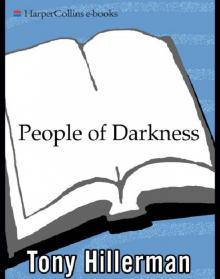 People of Darkness
People of Darkness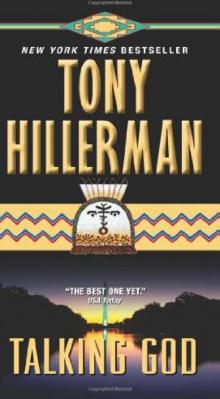 Talking God jlajc-9
Talking God jlajc-9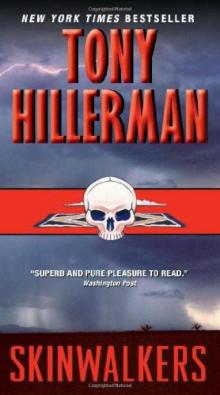 Skinwalkers jlajc-7
Skinwalkers jlajc-7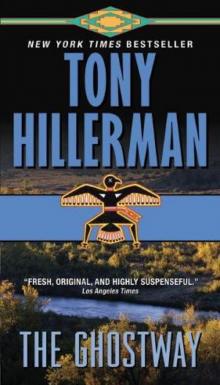 The Ghostway jlajc-6
The Ghostway jlajc-6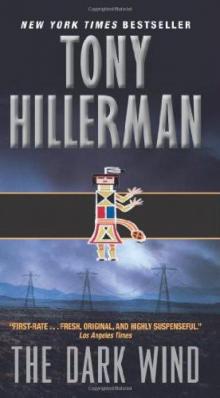 The Dark Wind jlajc-5
The Dark Wind jlajc-5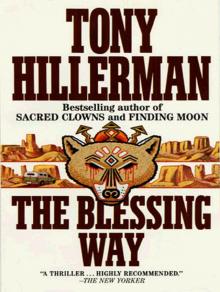 The Blessing Way
The Blessing Way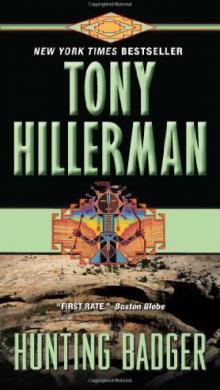 Hunting Badger jlajc-14
Hunting Badger jlajc-14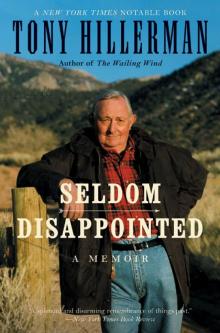 Seldom Disappointed: A Memoir
Seldom Disappointed: A Memoir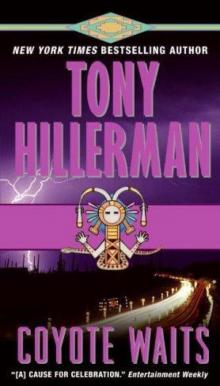 Coyote Waits jlajc-10
Coyote Waits jlajc-10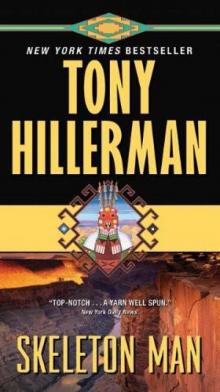 Skeleton Man jlajc-17
Skeleton Man jlajc-17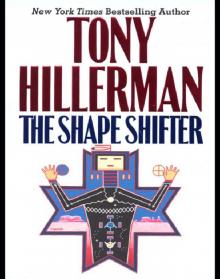 The Shape Shifter
The Shape Shifter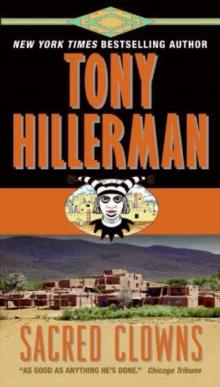 Sacred Clowns jlajc-11
Sacred Clowns jlajc-11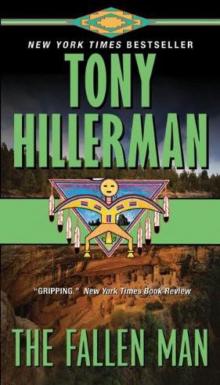 The Fallen Man jlajc-12
The Fallen Man jlajc-12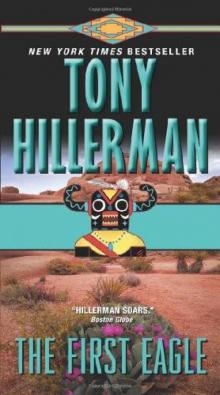 The First Eagle jlajc-13
The First Eagle jlajc-13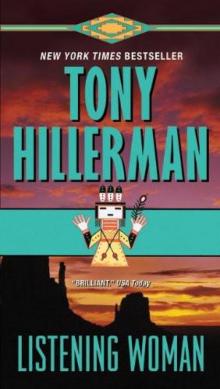 Listening Woman jlajc-3
Listening Woman jlajc-3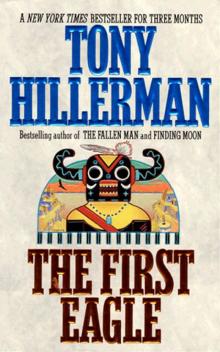 The First Eagle
The First Eagle Skeleton Man
Skeleton Man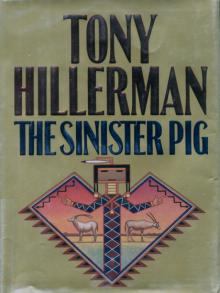 The Sinister Pig jlajc-16
The Sinister Pig jlajc-16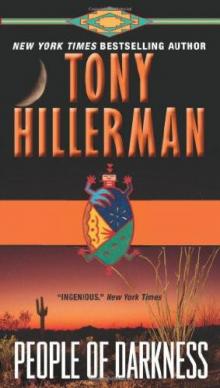 People of Darkness jlajc-4
People of Darkness jlajc-4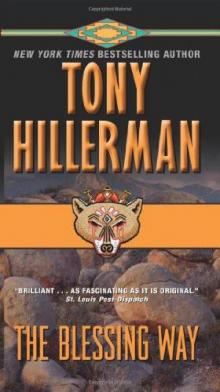 The Blessing Way jlajc-1
The Blessing Way jlajc-1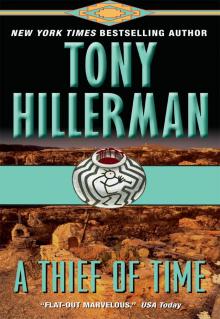 A Thief of Time
A Thief of Time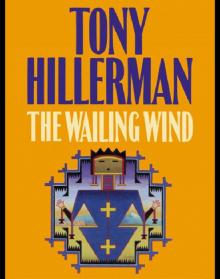 The Wailing Wind
The Wailing Wind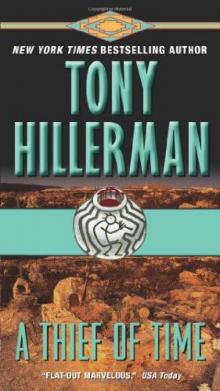 A Thief of Time jlajc-8
A Thief of Time jlajc-8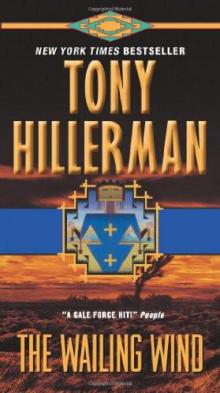 The Wailing Wind jlajc-15
The Wailing Wind jlajc-15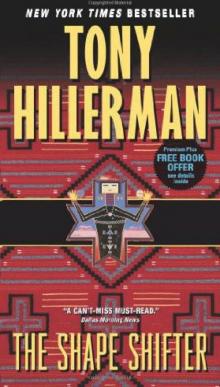 The Shape Shifter jlajc-18
The Shape Shifter jlajc-18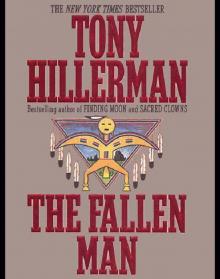 The Fallen Man
The Fallen Man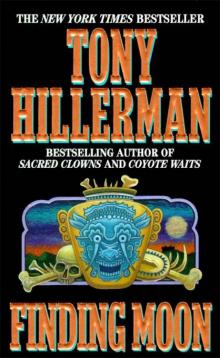 Finding Moon
Finding Moon